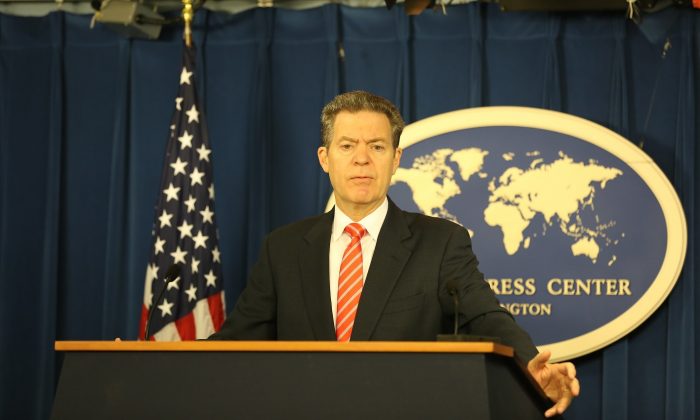October 25, 2018 Updated: October 25, 2018
WASHINGTON—As the United States celebrates the 20th anniversary of the International Religious Freedom Act, 80 percent of the world’s population lives in a religiously restricted environment, with China intensifying its persecution of all faiths.
Even so, the United States will continue to pursue the religious freedom of everybody, everywhere, as a God-given right, said U.S. Ambassador-at-Large for International Religious Freedom Samuel Brownback on Oct. 25.
In a briefing at the Washington Foreign Press Center in the National Press Building to mark the anniversary of the act signed into law in 1998, Brownback said that the United States recognizes that protection of religious freedoms remains insufficient across the world.
Speaking about the “deplorable” situation in China, including the persecution of the Uyghur population, Brownback said: “The religious restriction on the Uyghurs is wrong. It is violation of the U.N. Declaration of Human Rights. People have a right to pick and practice their own faith as they see fit.
“That’s clearly not being allowed in Xinjiang, nor is it being allowed in other areas of China and of other religious groups, whether they be Christian, Falun Gong, Buddhist. The Dalai Lama situation in Tibet is long-suffering and terrible. We’re seeing all these communities facing increased persecution in China.”
Brownback said that all nations should embrace religious freedom as it had been proven that this has the potential to bring about prosperity and more secure societies.
He also stressed that the Trump administration is doing things differently from the previous administration, giving the example of the first-ever International Religious Freedom Ministerial held in July.
“Eighty-four different countries were there, … I believe we’re at a watershed moment,” he said. “I believe the gates of religious freedom are going to fly open around the world, that the iron curtain against religious freedom is coming down, and that more and more countries will embrace this.”
Earlier this month, when releasing the 2018 annual report on human rights and the rule of law in China, Sen. Marco Rubio (R-Fla.) and Rep. Chris Smith (R-N.J.) urged the United States to adopt a “whole of government” approach to dealing with human rights in China.
Smith said that the United States should include human rights in trade negotiations with China and in every aspect of U.S. policy.
The International Religious Freedom Act of 1998 was bipartisan legislation to promote religious freedom as a foreign policy of the United States, to promote greater religious freedom in countries which engage in or tolerate violations of religious freedom, and to advocate on the behalf of individuals persecuted for their religious beliefs and activities in foreign countries.
A follow-on act, the Frank Wolf International Religious Freedom Act, also bipartisan, was passed in late 2016.
Source: https://www.theepochtimes.com/us-dissatisfied-with-religious-freedom-around-the-world-says-ambassador-brownback_2700029.html

U.S. Ambassador at Large for International Religious Freedom Samuel D. Brownback speaks to celebrate International Religious Freedom Day, which commemorates the passage of the U.S. International Religious Freedom Act in 1998, at the Foreign Press Center in Washington on Oct. 25, 2018. (Jennifer Zeng/The Epoch Times)
